Luisa Perkins began reading and then writing stories as a young girl as a way to find peace and escape from a troubled home life. She is now an acclaimed author who has published many books and essays, including Dispirited and The Book of Jer3miah: Premonition. Her latest novel, Prayers in Bath, centers on an LDS female archaeologist who discovers an ancient text that changes her view on the world and herself. Luisa deeply believes in the power of stories and their necessity in helping readers find community and home. Luisa lives in California with her husband and six children.
Tell me about where your love for writing began and when you started writing.
I started writing when I was a small child. I learned to read very early, and since I had a rather difficult childhood I read a lot for escape. Even when I was really young, I thought about how people writing books was such a gift to me. It was a gift to have that escape and I wanted to give that gift to other people. It’s just always something I wanted to do, to contribute to the world of books. I started writing stories when I was a little kid and off and on as a teenager, so it’s always been something that’s been a part of me. When I got married and first started having kids, I took a lot of breaks because there was always so much going on, and I focused a lot more on short form. I would do song lyrics or essays or things that could be completed pretty quickly, so I was away from long-form fiction for a long time, but then in 2007 I started writing novels again.
Can I ask what some of your favorite books were growing up?
My very favorite children’s book is one that no one’s ever heard of. It’s called The Diamond in the Window by Jane Langton. And it’s pretty brilliant. I’ve probably read it 20 times. But you know, I liked other children’s classics like The Secret Garden, and the Little House on the Prairie books. I liked to read about girls and women a lot, so I liked books like Anne of Green Gables. And I loved to read about happy families. I found myself drawn to books that featured happy families, because I didn’t know how to make one—I had never seen a happy family close up in real life, so I loved A Wrinkle in Time and all its sequels. I read them not only for the fun fantasy aspect of the books, but because that family was just so nurturing and warm and they really enjoyed each other’s company. Louisa May Alcott has a lesser-known book called Eight Cousins, and I’d read it over and over again for the same reason. I loved all the Little Women books too, but Eight Cousins for some reason really struck a chord with me.
Was The Diamond in the Window a book that featured a happy family? Was that what drew you to it? I have never read it before.
Well, it’s set in Concord, Massachusetts, and I grew up in California but always wanted to move to New York or New England, and it’s a really terrific fantasy. I’m also really drawn to books about houses, especially magical houses. It’s about a brother and sister. They bicker but they love each other, and they’re being raised by their aunt and uncle—and so they have a very happy family, but also a very unconventional family, which also appealed to me. And there are lots of references to Alcott and Thoreau and Emerson and all the writers in Concord, and the book introduced me to all of those. I think I first read Little Women after I read The Diamond in the Window because I wanted to learn more about Louisa May Alcott after reading that book. So it was kind of a gateway book for me.
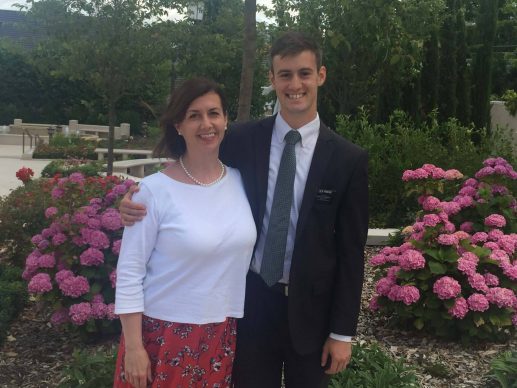
Luisa with her son
So you kept reading and writing while you were growing up. What did you study at university? Did you study English or a different major?
I started at BYU, but then I left and moved to New York City when I was 21 to save up for a mission. When I got home from my mission I got married pretty quickly, but I hadn’t finished school yet so I finished my degree through BYU’s independent study program. At that time, it was a really interesting conservatory program, and my Bachelor’s Degree is in Independent Study, but my emphasis was in Writing. So for my senior project, I did a lot of research and character sketches and world building for a fantasy novel, and then I wrote a long outline and presented that as my senior project.
What are the questions or themes you cover in your own writing? I’m sure it’s different depending on what ideas you’re thinking about at the time, but are there questions or ideas that you like to grapple with in your own writing?
I write about home a lot, and about different aspects of home. My novel Dispirited, which is probably my best-known book, is really all about what it means to be home, not only in your house but in your family and in your body. And Prayers in Bath, too, is very much about home. The main woman feels like an outsider in a lot of ways. She’s a convert to the Church, she has been struggling with infertility, she and her husband are living in Bath and they’re Americans, so she comes from this place of being on the outside. She struggles a lot with belonging, and then the experiences she encounters in the novel bring her to the very inside of the Church and the Gospel in kind of an unconventional way.
Where would you say you have found home for yourself?
I feel like I am very lucky that I have a fantastic husband. But even when you have a fantastic husband, you have to work really hard at creating home. And again, you have to have that passion for working hard and that’s important. I find home in my own children, I have 6 kids, and so I feel at home with them. And then once in a while you have a friend or two, and you just feel understood by them. For me, a lot of home is feeling like people understand me. For example, moving to a new ward at one point was rough for me because I didn’t feel that. It seemed like people valued me for what I could do, but not for who I was. So that was a rough transition for me because I felt seen, but not understood. I also feel at home with good writer friends, and with other women in the Church who I feel really understand me. Home and understanding are closely linked for me.
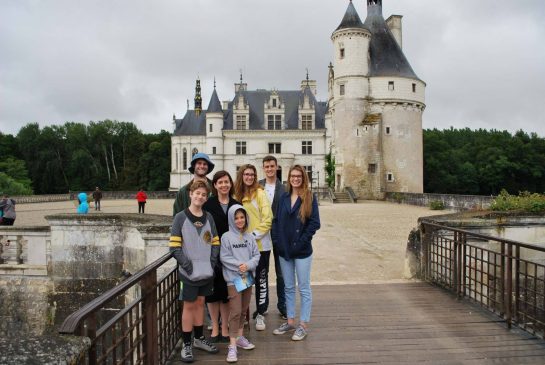
Luisa and her family on vacation in France
In Prayers in Bath your main character finds and translates an ancient text—where did you come up with the idea for that?
A friend of mine from Wales mentioned these real-life curse tablets that are on display in Bath. I’m excited to go see them in real life this summer; I haven’t seen them yet. And these curse tablets—they weren’t always curses. They were sometimes prayers, and people would scratch them onto lead and roll them up and throw them into the hot springs there in Bath. They were usually prayers to Minerva Sulis, the local manifestation of Minerva that the Romans co-opted, or to Mercury, usually asking for revenge, or to bring someone’s wife back to them. I found that idea of prayers being thrown into the water so interesting. Other pieces of the story that came to me were the Glastonbury Legend that I go into a lot into the book.
What is the Glastonbury Legend?
The Glastonbury Legend is an English legend that when Christ was a child, He was brought into England by Joseph of Arimathea, and spent time there. It’s a big deal to a lot of people in England. I don’t know if you know the William Blake poem “Jerusalem,” but it references this legend. The words of it are pretty amazing. To paraphrase “Did Jesus come here? Did He do things here?” And the legend is a big part of the novel. I wanted to have this ancient scroll that the main character finds be an account of the resurrected Christ visiting England again and doing what he does with the Nephites, since in 3 Nephi, He says He’s going to go do that. So, spoiler, but that’s what my character translates.
And does the main character struggle with that in any way?
Yes, she does. And her husband struggles with that because she’s translated scripture and she’s a woman. That becomes a big source of conflict for them for a while, and I grapple with the issues of the questions of what women can and cannot do, inside and outside the Church. I hope I did it in a way that’s not threatening, because I am very committed and faithful to the Church and to the Gospel. But I think that there are things that can change and will change with women in the Church, and women in the Gospel, for that matter.
Are women’s issues—especially issues with women, faith, and believing—common themes you grapple with in your writing?
Well, yes and no. Not to the overt degree that my character does in Prayers in Bath. I’ve mainly written about female main characters, and they always have some kind of spiritual existential struggle. I think that’s something I’ll continue to explore in my writing as long as I’m around. It’s not something that’s easily resolvable.
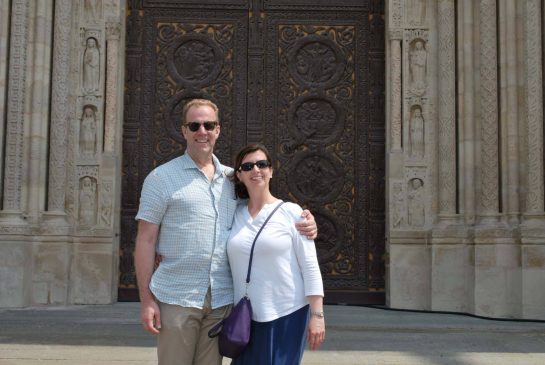
Luisa and her husband
Yes, and it’s something that’s so individual. But has writing about women’s existential spiritual struggles helped you resolve issues or look at things in a different light?
I think that any writer is not just wanting to tell stories but is also on a quest for self-knowledge. Any good writer is on that quest. Sometimes people ask me if characters are based on me, or anybody else, and I almost always say, “All of my characters have some of me in them—not just the protagonist, but all my characters have a bit of me in them.” I tend to get deep emotionally into my writing process. It’s very immersive as far as the emotions go. If I’m writing a sad scene, it will make me cry. If I’m writing a scary scene, I’ll be kind of freaked out. I hope that comes across to the reader, that I put a lot of emotion into my work. A couple times I’ve taken on writing projects because people said that they would pay me to do it, and that never works out the way I’d like it to, because I can’t just toss stuff out; I have to make it my own, if that makes sense.
Along those lines, how does your faith shape your creative process or shape your writing?
A couple of different ways. One is the fact that I write at all. I’ve always felt very strongly that we shouldn’t just be consumers, we should be creators. You can be creating a garden or a relationship or a legal brief, or however you create, but we should all have some kind of creation in our lives and not just be mindlessly consuming all the time. That’s one of the reasons I write, because I feel that’s what God wants us to do. He wants us to be creating.
My faith also affects themes and scenarios. One time I had an idea for a novel about four women who are good friends, and this other woman who is not very mentally well wants to become a part of their group and belong with them. The group of four women are torn. They are LDS women, so they want to be kind, but they don’t want her in their group. So they try really hard to be nice and friendly, but their tension navigates the questions of what’s our boundary and how do we negotiate being everyone’s friend and everyone’s neighbor, but wanting to have our own group? A publisher was really interested in the idea, because it’s a mystery story. The woman who is odd disappears. So you see the story through the eyes of these four women who are trying to figure out what happened with the odd woman and also dealing with a lot of guilt, because they feel like they might have had a part of where she’s gone off to.
The publisher was interested in it, and I sent him the first several chapters of the story. But he said, “Oh, I really like it. The thing that I just can’t get my mind around is why would these women be so nice? If they don’t like her, why wouldn’t they just say, ‘Get lost?’” And I thought, “You’ve never been to Relief Society, have you?” But he wasn’t a member of the Church, so that’s something he literally could not get. It was hard for him to understand that so many times in our culture, we have that tension between wanting to love everyone but wanting to have our own group—at least I have.
I think we all have.
Anyway, he ended up rejecting the story because he didn’t find it believable, and that tension was core to the story. But he was a New York publisher and not a member of the Church, and I think that maybe if I had marketed it to LDS publishers, I don’t think that would have been an issue at all.
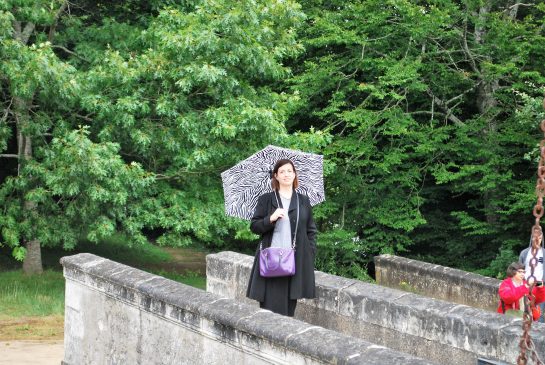
So how have you noticed this tension of inclusion in your own life and what has helped you find that balance in the Church?
I think that one reason why I try to be more inclusive is because I’m an introvert, and I’ve been on the other side. I’ve been the needy one that other people have tried to push away. When I grew up, the child of a divorced woman—at least in my generation—was almost like a leprosy that people thought would be catching to other people’s children, this brokenness they saw. And because I have been on the other side of not belonging, and because it’s very easy for me to put myself in other people’s shoes, it can be hard for me to negotiate boundaries. I don’t know if I’ve been graceful in negotiating them. I still struggle with boundaries and knowing when enough is enough, when it’s okay to say no, etc. I’m 50 years old and still trying to figure things out.
The Church can be a very extroverted Church, and that can sometimes be difficult for introverted people. What has helped you, as an introvert, get outside of your comfort zone in an extroverted Church?
I think it’s interesting you say that because we do talk about getting outside of ourselves, but we’re trying to create a place of refuge for everyone, so how do we allow discomfort for ourselves to create comfort for others? That’s a really interesting question. Honestly, I don’t think that I would be as skilled a teacher as I am if it weren’t for the Church, because of having to accept callings. When I got my first teaching calling, I was 16 years old and I had 12 Sunbeams to teach. I was painfully shy around adults, but this was teaching 3-year-olds. Looking back on it, I think, who would trust a 16-year-old with twelve 3-year-olds? But I guess my ward was desperate. So that eased me into social interaction with a group, whereas if I’d been given a calling to teach in Relief Society or Young Women right away, that would have been a bridge too far. So now I’m much more comfortable in front of groups of people, whereas if I didn’t have the Church and those gentle exhortations to get outside of myself, I don’t think I would have grown in those ways quite so easily. I really believe people can do anything if they just practice enough. I’ve been teaching for 34 years in the Church one way or another, and you tend to get good enough if you keep doing something that long.
What about writing? There has to be talent there, but there also has to be practice, and putting yourself out there for agents and getting rejections and all those different things. There are a lot of women in the Church—women of my generation—early- and mid-20s, who want to be writers and authors. What advice would you have for LDS women who want to pursue writing?
I’d ask anyone who wants to be a writer to ask themselves really honestly, “Do I want to be a writer or do I want to write?” I’ve known successful writers of both kinds. I’ve known people who are successful writers, not necessarily because they love writing, but they love being a writer and talking about writing. I also know a lot of unsuccessful people who talk about writing, but never really do it. I think you have to enjoy at least part of the process of it in order to be able to do it successfully and be able to do it as long as you need to do it to get good at it.
My first novel came out when I was 28. I thought it was a was a pretty good book and that I did a pretty good job. And looking back I still think it’s fine, but now I’ve gotten better with time, and I think that should be everybody’s goal. You need enough passion for writing to keep doing it, even when it’s hard, and even when you’ve gotten 100 rejection letters. I’ve received more than I can count. You have to get over that. You have to be able to show your work to people and not fall apart when they tell you what doesn’t work about it. I’ve seen quite a few people struggle with that. They’ll have their husband or their visiting teacher read their story and they’ll say, “It’s wonderful!” But then they send it to New York and it gets trashed, and probably rightfully so. And then they’ll retreat and think, “Oh, I’m not going to do that anymore.” But you have to dance between vulnerability and resilience, and that only comes from experiencing rejection and having enough faith in yourself to get up and try again.
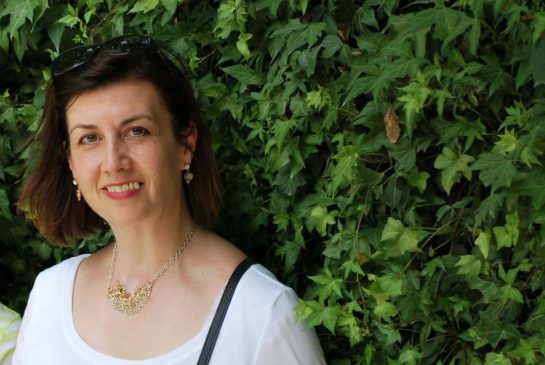
Who are some of your favorite authors now? Has it changed at all since you were young?
Writers like Mark Helprin, Umberto Eco—those are two of my big favorites. Margaret Atwood and Susanna Clarke as well. Those are some of my desert island writers. Things I’d go back to over and over again.
That’s wonderful criteria for re-reading—sheer enjoyment. Is there anything else that you’d like to bring up or that you wanted to mention?
There was a woman at church who gave a talk a couple of weeks ago and it’s been something I’ve been thinking about ever since—she talked about objectification. And she talked about how we’re all familiar with objectification from a negative standpoint, but she thinks it’s a lot less often that we talk about positive objectification. For example, we love somebody, but we love them for what they do for us instead of who they are. My daughter and I were talking about this today at a service project. We were asking, “Do you even think it’s possible and positive to do that?” And, yes. We love the Savior. We don’t love Him personally; we don’t know His personality or we don’t know what His favorite food is, but we love what He did for us. So I think that positive objectification can be the beginning of a deeper love. But I think that a lot of times we’re comfortable with loving people for just the surface and loving people for their roles. I think it’s a childlike love. For example, you love your grandma, simply because she’s your grandma, but then you’re surprised to learn about the things she did when she was 20. So that’s something I’ll be exploring a bit more, and I think more people should think about this concept.
I think that it’s especially important in the Church that we’re able to do this because we will sometimes have our testimonies shaken by someone’s flaws, especially church leaders’ flaws. We need to ask ourselves, do we love someone because they’re the stake president or because they’re human? It’s something that I’ve been thinking a lot about recently because my husband was called to be the stake president almost a year ago this week, and in a sense I kind of feel like an imposter, because I’ve looked at stake presidents’ wives all my life and never—I don’t think I’ve looked at them as real people. So here I am a stake president’s wife and thinking, “Boy, we’ve got them fooled!” When I think of all those other people who have been here in this role I just wonder if they’ve also wrestled with the responsibility that comes from this title.
The authority and mantle obviously matter, but who the person is matters too, and they will bring their own talents into whatever calling they’re given.
And that’s why grace is so important. Because I’m going to have bad days and people are going to see me behaving badly and I just have to hope that grace will cover me when I’m not at my best.
Is there anything else you’d like to say about writing, life, stories?
Just that we learn through stories in the Church and I think stories are really important in the gospel. We learn through stories in the temple, we learn through stories in the scriptures, and I always hope that people will be a little bit broader in what they’ll accept in a story. Stories can help us deal with unanswered questions. The whole Church was started because of a question, and we have to be okay with questions that don’t get answered right away, or ever, in this life. But stories can help.
At A Glance
Name: Luisa Perkins
Age: 50
Location: Sierra Madre, California
Marital History: Married in 1990 to Patrick Perkins
Children: Six children, ages 23, 20, 18, 16, 13, 9
Occupation: Writer
Schools Attended: BA from BYU; MFA from Vermont College of Fine Arts
Languages Spoken at Home: English, French
Favorite Hymn: Jesus, the Very Thought of Thee
Personal Website: http://kashkawan.squarespace.com/
Interview Produced by Megan Armknecht
